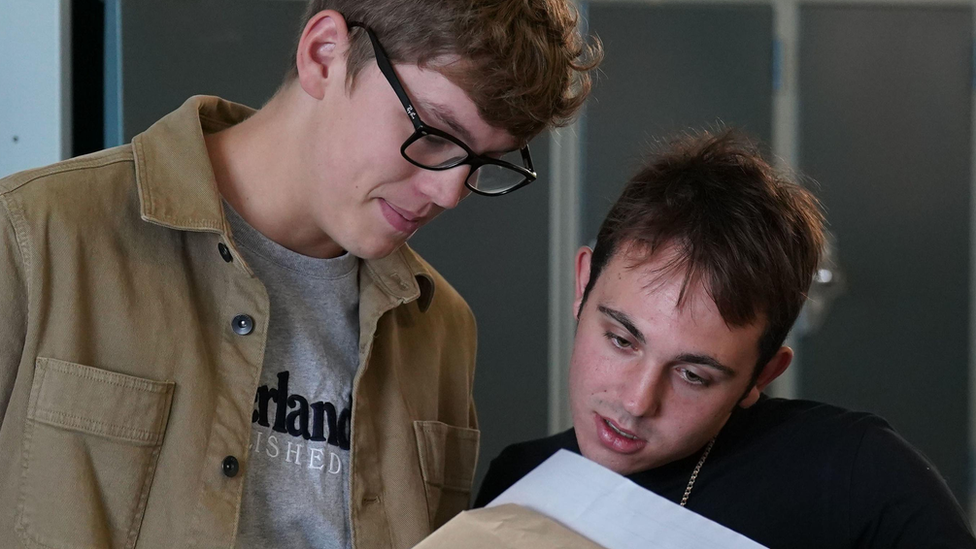What are BTecs and how are they graded?

- Published
About 170,000 students have received their results for BTec Tech Awards, BTec Firsts and BTec Level 2 Technical courses.
But what are BTecs, and how are they marked? Here is everything you need to know.
What are BTec Firsts and BTec Nationals?
A BTec, which stands for the Business and Technology Education Council, is a practical qualification. Courses are assessed through exams, regular coursework and projects, and sometimes placements.
BTec Firsts are Level 2 qualifications, meaning they are equivalent to GCSEs. Students often take a mixture of the two. They can be helpful for people trying to get into further education colleges.
BTec Nationals are Level 3 qualifications, so can be taken alongside or instead of A-levels.
They are studied over one or two years.
Research suggests one in four students use them as a route into university, while others gain occupation-specific skills and go straight into employment.
How are BTecs graded?
BTecs are graded on a scale:
Starred Distinction/Distinction Star (D*)
Distinction (D)
Merit (M)
Pass (P)
Some BTecs are worth two or three A-levels.
Students normally receive their results on the same days as A-level and GCSE students, but some receive them before this.
Who takes BTecs?
There are approximately 280,000 students studying at least one Level 3 applied general qualification, according to the Sixth Form College Association.
A further 200,000 are estimated to be doing BTec Firsts and other BTec qualifications.
Health and social care and applied science are among the most popular BTecs. Other subjects include construction, electrical engineering and art and design.
BTec Nationals can be sat by any age group. In fact, most are taken by those over the age of 22, external as they develop practical career skills.
They are particularly popular among white working class students, according to research by the Social Market Foundation think tank, external.
Other vocational courses are available in the UK, including National Vocational Qualifications, external (NVQs), TechBacs, external, Cambridge Technicals, external and Scottish Vocational Qualifications, external (SVQs).

BTec results normally come out on the same days as A-level and GCSE results
How are BTecs changing?
In 2020, there were more than 12,000 vocational qualifications at all levels, offered by more than 150 awarding bodies, according to Ofqual, which oversees qualifications in England.
Plans by former Conservative governments to streamline post-16 education had meant many BTecs and other Level 3 courses were due to lose their funding, to make way for T-levels.
However, the Labour government paused and reviewed the plans, and has since announced that 157 qualifications will no longer be scrapped as planned.
They include "key courses" in "important sectors", external, the DfE said, such as agriculture, engineering, manufacturing and health and social care.
Some have had funding confirmed until July 2026 and others until July 2027.
The government also confirmed that more than 200 qualifications with "with low or no enrolments" would still have funding withdrawn from 1 August 2025.
Sarah Hannafin, head of policy at school leaders' union NAHT, said that "for A-levels and T-levels to be the only two qualification pathways post-16 would have failed to meet the needs and ambitions of many students".
The government has confirmed the rollout of T-levels will continue.
In the first three years, T-levels have faced delays, high dropout rates and an exam board being fined £300,000 over "major failings" with the papers.